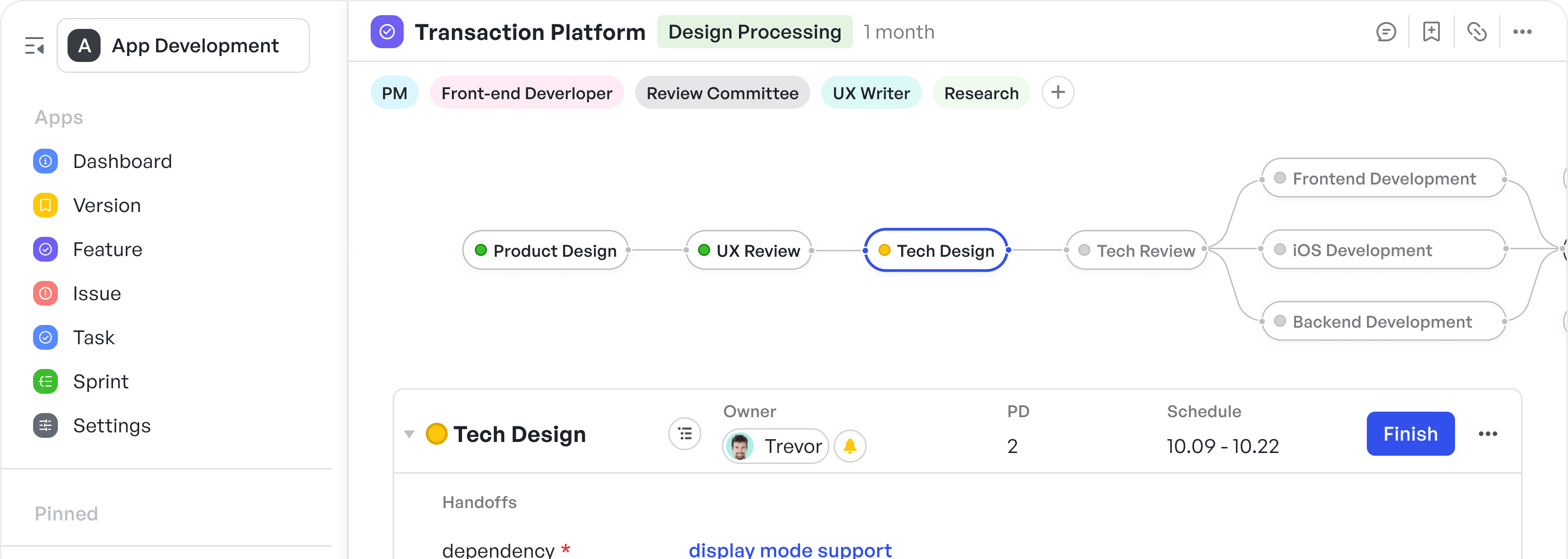Project management tools are holistic systems that provide an infrastructure for planning, executing, and monitoring projects. These tools are designed to handle the complexities and multiple facets of entire projects, accommodating various tasks, milestones, schedules, and resources.
In contrast, task management tools offer a focused approach centered on organizing and tracking individual tasks and small sets of activities. These are typically simpler and more user-friendly, ideal for managing day-to-day responsibilities, keeping track of deadlines, and facilitating personal or team productivity on a smaller scale.
Understanding these differences can significantly impact how teams and individuals approach their work and ultimately, how successfully they achieve their objectives. This article sets the stage for a detailed discussion about the unique features, benefits, and best uses of project management and task management tools.
Key Features of Project Management Tools
Project management tools are designed to facilitate the planning, execution, and monitoring of project-related tasks. They are integral in handling the complexity and breadth of entire projects and often come equipped with features not typically found in simpler task management tools.
Risk Management
Risk Management is a pivotal feature in project management tools. These tools provide frameworks for identifying, assessing, and responding to potential risks that could impact the project. By enabling project managers to foresee potential issues and mitigate them proactively, these tools help ensure projects stay on track and within budget, significantly reducing unforeseen hurdles.
Change Management
Change Management capabilities allow project managers to handle changes in project scope, timelines, resources, and requirements efficiently. Project management software generally includes features for submitting, tracking, and approving changes, ensuring that all alterations are logged and assessed for impact. This functionality is crucial for maintaining project alignment with business goals and stakeholder expectations.
Dependency Tracking
Dependency Tracking is a crucial capability intrinsic to project management tools, pivotal for defining and visualizing the interconnections between different tasks and milestones. This functionality is fundamental to applying effective project scheduling techniques. By accurately monitoring dependencies, managers can sequence tasks appropriately, adjust project timelines based on the completion rates of tasks, and anticipate the cascading impact of delays on critical tasks. This comprehensive oversight is essential for maintaining the integrity and timeliness of the project schedule.
You may also interested in
Key Features of Task Management Tools
Task management tools, while simpler, are incredibly effective for managing daily activities and smaller projects. They focus on individual tasks or small groups of tasks, promoting productivity and organization without the overhead of comprehensive project management features.
Simplicity in Task Prioritization
Task management tools excel at providing Simplicity in Task Prioritization. Users can quickly categorize tasks into priority levels, often through drag-and-drop interfaces, which helps in quickly identifying which tasks need immediate attention. This function streamlines workflow and boosts efficiency without bogging down users with complex project management paradigms.
Visual Task Tracking (Kanban Boards)
Visual Task Tracking through Kanban Boards is a standout feature of many task management tools. This approach allows teams to visualize work at various stages of completion, facilitating a clear understanding of progress and immediate operational bottlenecks. Kanban boards provide a dynamic and intuitive way to manage workflow and are particularly effective in environments where tasks move through several stages of execution.
Deadlines and Task Assignments
Setting Deadlines and Task Assignments is a fundamental feature of task management tools. These tools allow for the assignment of tasks to specific team members with associated deadlines, which can typically be monitored through the tool itself. Notifications and reminders are common features that keep everyone aligned with their tasks and timelines, thereby enhancing individual accountability and team productivity.
In summary, while both project and task management tools have their unique sets of features tailored to different needs, understanding these distinctions can help organizations select the right tool based on their specific operational requirements and project goals.
Function Comparison
Risk Management:
- Task Management Tool: Does not include tools for identifying or mitigating risks.
- Project Management Tool: Offers the ability to identify potential risks, assess them, and plan mitigation strategies to ensure the project stays on track.
Change Management:
- Task Management Tool: Simple tools might not handle changes beyond task-level updates.
- Project Management Tool: Includes comprehensive features for managing changes within the project scope, schedule, and budget, with an approval workflow.
Examples & Free Template
250px|700px|reset
加载中,请稍后
Critical Path Method (CPM):
- Task Management Tool: Not included.
- Project Management Tool: Determines the sequence of critical and non-critical tasks, the longest stretch of dependent tasks, and the shortest possible project duration.
Related Post
Resource Allocation and Management:
- Task Management Tool: Typically doesn't include.
- Project Management Tool: Allows managers to assign resources like manpower, budget, and equipment to specific tasks or phases of a project, and monitor their utilization.
Dependency Tracking:
- Task Management Tool: Usually limited or not available.
- Project Management Tool: Enables users to set up and visualize dependencies between tasks, so that changes in one task can automatically adjust the schedules of dependent tasks.
250px|700px|reset
加载中,请稍后
Documentation Control:
- Task Management Tool: Usually provides basic document sharing.
- Project Management Tool: Often includes sophisticated document management systems that track revisions, approvals, and distributions within project workflows.
Integration Capabilities:
- Task Management Tool: Limited integration with external systems.
- Project Management Tool: Typically offers extensive integration with other software systems like CRM, ERP, and more for seamless data flow across tools.
Custom Reporting:
- Task Management Tool: Basic reporting on task completion and due dates might be available.
- Project Management Tool: Features advanced reporting capabilities that can provide insights on project performance, progress, and alignment with objectives.
These specialized functions empower project managers and teams to handle comprehensive project workflows and complexities that go beyond the scope of simple task management.
Which software only focuses on task management?
Task management software is designed to help individuals and teams organize, track, and prioritize their work. Here are a few examples of software that focus primarily on task management:
Todoist
Known for its simple and user-friendly interface, Todoist allows individuals and teams to manage their tasks and deadlines effectively.
250px|700px|reset
加载中,请稍后
Another task management tool that is popular for personal productivity.
250px|700px|reset
加载中,请稍后
Microsoft To Do
This is a task management application by Microsoft that helps users create lists and tasks, set reminders, and personalize their organization system.
250px|700px|reset
加载中,请稍后
Remember The Milk
A straightforward task management tool that helps users manage their tasks from anywhere and works across various devices.
250px|700px|reset
加载中,请稍后
These tools are centered around helping users manage their daily tasks and are less suited for the complex needs of project management.
What software can be used for both project management and task management?
Several software suites blend both project management and task management functionalities, catering to the needs of teams looking for a comprehensive solution. Here are some notable examples:
Jira
Strength: Agile structure
Primarily known for its strong project management features, especially in the software development sector, Jira also provides detailed task management options such as issue tracking.
250px|700px|reset
加载中,请稍后
Strength: powerful solutions and templates
This platform is both user-friendly and robust, allowing teams to manage projects with big-picture planning tools while also tracking individual tasks and their progress.
250px|700px|reset
加载中,请稍后
Meegle
Strength: visualized & node-driven workflow with task-splitting function
It offers a unified workspace that combines project planning with individual task management, suitable for various team sizes and industries.
250px|700px|reset
加载中,请稍后
250px|700px|reset
加载中,请稍后
Trello
Strength: attractive Kanban interface
Though it's often seen as a task management tool with its Kanban-style boards, Trello can also be used for project management through power-ups and integrations.
250px|700px|reset
加载中,请稍后
Asana
Asana provides a clean interface for task management with to-do lists and Kanban boards, while also offering timeline and portfolio tools for project management.
Strength: powerful timeline with sub-tasks
250px|700px|reset
加载中,请稍后
How to Choose Between a Project Management Tool & a Task Management Tool
Choosing the right management tool is crucial for optimizing your team's productivity and aligning with the project's demands. Here's a step-by-step guide to help you decide whether a project management tool or a task management tool best fits your needs considering factors like team size, project complexity, integration needs, and reporting requirements.
Step 1: Assess Your Team Size
Smaller Teams: If your team is small, a task management tool may suffice. These tools are typically easier to use and focus on day-to-day tasks, making them suitable for teams that do not require extensive collaboration features.
Larger Teams: For larger teams working on multiple projects or large-scale projects, project management tools are more appropriate. They offer advanced features like resource allocation, collaboration tools, and comprehensive dashboard views that can handle the complexities of managing a large team.
Step 2: Evaluate Project Complexity
Simple Projects: Task management tools are ideal for simple projects with a straightforward workflow and few dependencies. These tools help manage individual tasks efficiently without the extra features that larger projects might require.
Complex Projects: Project management tools are better suited for complex projects involving multiple stages, changing scopes, or several interdependent tasks. These tools provide features like risk management, dependency tracking, and change management, which are critical for handling such complexities.
Step 3: Consider Integration Needs
Few Integration Requirements: If your project does not require the tool to integrate with many other systems (like CRM, ERP, etc.), a simple task management tool might be adequate.
High Integration Complexity: Choose a project management tool if your project needs to integrate with multiple other systems. These tools generally come with more robust integration capabilities or APIs that facilitate seamless workflow across different platforms.
Step 4: Look at Reporting Requirements
Basic Reporting: If your needs are limited to basic reporting, such as checklists and minor productivity reports, task management tools generally offer enough functionality.
Advanced Reporting: For needs that involve complex reporting—like project tracking, performance metrics, and custom reports—a project management tool is indispensable. These tools often offer customizable reports that can analyze data deeply to provide insights into project health and team
FAQ Sections:
What is the difference between task management and project management?
Task management focuses on organizing and managing individual tasks related to daily operations or specific, independent responsibilities. It is generally simpler and involves task tracking, and prioritization. Project management, on the other hand, encompasses the comprehensive management of an entire project, from initiation to closure, including planning, resource allocation, risk management, and stakeholder communication. It deals with longer-term goals and often requires coordinating a series of interlinked tasks to achieve broader project objectives.
Can task management tools handle projects?
Task management tools can handle smaller or less complex projects that don't require detailed planning across multiple phases or rigorous resource management. For projects involving multiple team members, stages, or significant risk and change management, a dedicated project management tool is better suited as it offers specific features for large-scale project coordination.
What is the best software for both project and task management?
The best software for handling both project and task management often provides a hybrid approach. Meegle is a good example, as it offers flexibility and features for managing day-to-day tasks through a straightforward interface while also supporting broader project management functionalities like planning timelines, resource allocation, and progress tracking. Other notable options could include Asana and Monday.com, both of which are versatile enough to cater to various degrees of project complexities and task management needs.





